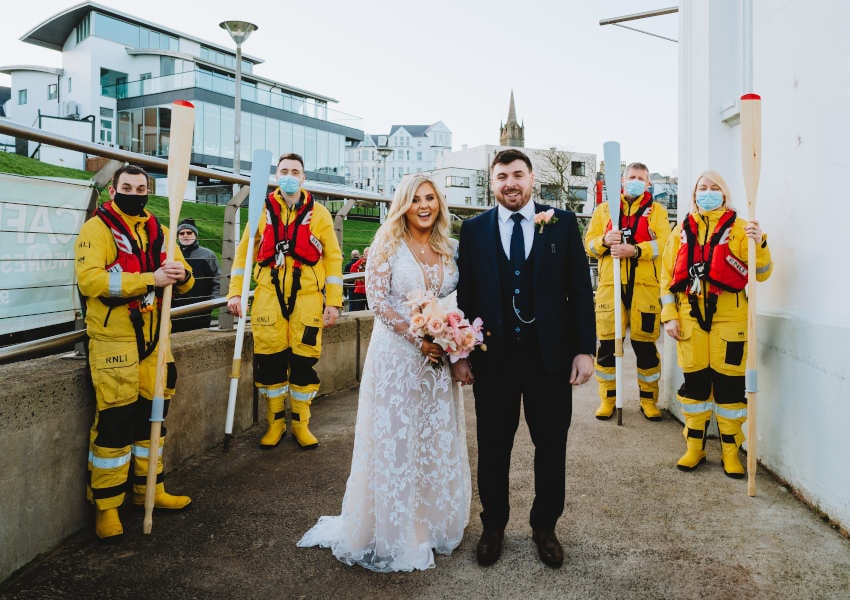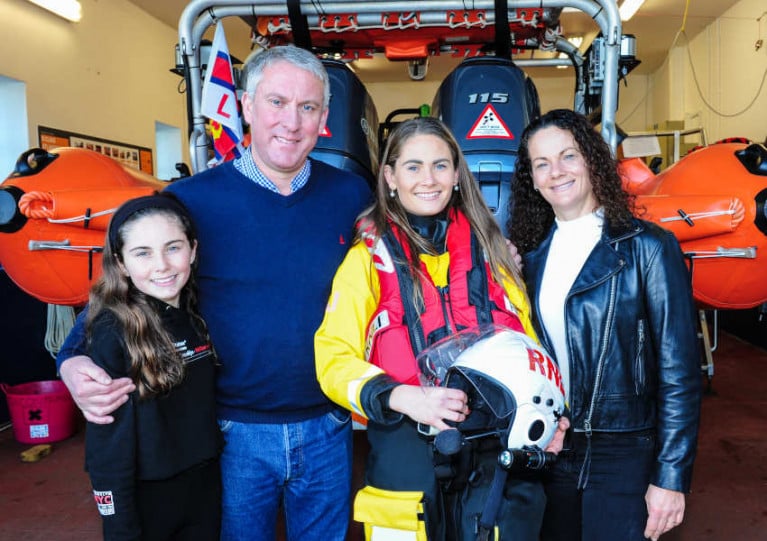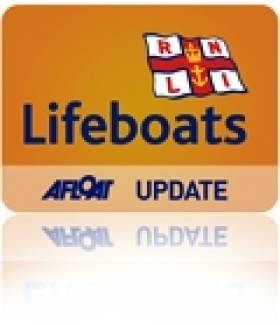Displaying items by tag: Appeal
The families of RNLI lifeboat volunteers have joined an all-Ireland appeal for support after the charity’s usual Christmas fundraisers were cancelled.
As previously reported on Afloat.ie, the charity that saves lives at sea launched its 2020 Christmas appeal as so many traditional community fundraising events such as raft races, open days and sea swims have had to be called off due to coronavirus restrictions.
In Donegal, Lorraine Cassidy’s husband James and sons Nathan (22) and Oisin (21) are all volunteer crew members on Bundoran RNLI’s inshore lifeboat. They know all too well how important it is for crews to have the right lifesaving kit and PPE.
Nathan adds: “RNLI volunteers have had a challenging year but thankfully, with many additional safety measures and procedures in place to ensure our safety, we have remained on call 24/7 throughout the pandemic.
“We have our standard PPE but now also wear masks and gloves and take extra precautions at sea. We know the extra PPE comes at a financial cost to the charity and during a time when fundraising activity has had to be halted.”
Further south are Robert and Colette Foster, whose daughter Caoimhe (20) is a volunteer crew member on Crosshaven RNLI’s inshore lifeboat.
“We are very proud that Caoimhe has been a volunteer lifeboat crew member in Crosshaven for three years now,” her father Robert says. “Our son Cillian (17) is also joining the crew but due to Covid-19, won’t be starting his training until next year.
“Our youngest Clodagh is 12 and having watched Caoimhe’s involvement in the last few years, she is already aspiring to be part of the future crew.”
In East Cork, Mark Nolan has been a volunteer at Youghal RNLI for 23 years, first as a crew member on the station’s inshore lifeboat where he served for 13 years before moving to shore crew. In 2017 he became a deputy launching authority where, among his tasks, he authorises the launch of the station’s lifeboat when the alarm is raised.
Mark’s son Jack (22) followed in his father’s footsteps five years ago when he, too, joined the lifesaving team in Youghal.
“You worry when the pager beeps and you are responsible for authorising the launch of the lifeboat,” Mark says. “While Jack is my son, I would have similar concerns for all crew members who go out on the lifeboat to save others who are in trouble at sea.”
 Jason Chambers and his wife Lauren received a special guard of honour from Portrush RNLI after their wedding last week | Photo: Mairéad McDaid/Remain In Light Photography
Jason Chambers and his wife Lauren received a special guard of honour from Portrush RNLI after their wedding last week | Photo: Mairéad McDaid/Remain In Light Photography
For Portrush RNLI relief mechanic Jason Chambers and his wife Lauren (McGee), who is a professional wedding photographer, 2020 has been a year like no other.
The couple who have two children, Tyler (9) and Isla (5), were originally due to get married on 18 April but when Covid-19 restrictions came in shortly after they returned from their hen and stag parties, they were forced to postpone and rethink their plans.
A stressful few months later and amid restrictions changing regularly, the couple eventually got their big day last week.
And much to Jason’s surprise and delight, four fully kitted-out lifeboat crew members representing the station were waiting outside the Arcadia in Portrush following the ceremony to provide a socially distant guard of honour to wish the couple well.
Lauren is also well used to family events being interrupted by the pager. And this Christmas will be no different for the Chambers.
“From the moment I met Jason, the RNLI pager became a part of my life, too. The lifeboat has always been in Jason’s blood and he comes from a long family line who have been involved in helping to save lives at sea for generations.
“It can be difficult seeing Jason leave when the pager goes, and he heads for the lifeboat. I worry about what he might go through when he is out on a shout. Even at Christmas, we know that he might have to drop everything like the other volunteers in Portrush, Red Bay or Larne and run out the door to go and save someone’s life.”
The same goes for Sue and Peter Irwin, longtime volunteers with Donaghadee RNLI, whose son Jack is a volunteer on Bangor RNLI’s inshore lifeboat.
“However, I also know how important the crew member’s role is and how rewarding it is for Jack to make his contribution just as it was for Peter and is for me as a fundraiser,” Sue says.
“The RNLI depends on the goodwill of others to support the work our volunteer crews do and that is why as a family, we would urge people if they can, to give to the Christmas appeal.”
Meanwhile, for one teenager who has helped out where he can at Kilkeel RNLI since he was a child, this year Christmas will be extra special as he will finally be eligible to join the crew on his 17th birthday on Christmas Eve.
Andrew Young’s father Gary has been a RNLI volunteer for the last 32 years. Watching his father work as station mechanic and helm, Andrew was inspired to become a crew member at a young age and is now looking forward to making his own contribution.
“I have been coming to the station with Dad for years and I always loved watching the crew prepare and train between call outs,” Andrew said. “I have helped out where I can but I am really excited now to start my own training to become a crew member and I will look forward to the day that I, too, can help bring someone in difficulty to safety.”
All families share pride in their loved ones’ lifesaving efforts, but they also worry when the pager beeps and they’re called out to save others who are in trouble.
The sense of relief when they help to bring those in difficulty back to safety, but also when they return home safety themselves, is one that they all feel.
And they’re united in declaring that the best Christmas gift they can wish for is any kind of donation, no matter how small, to the RNLI Christmas appeal.
Funds raised will provide the lifesaving kit volunteers so need to continue to help saving lives at sea. For more visit RNLI.org/Xmas
Woman Appeals For Help To Bring Fiancé Paralysed After Lusitania Dive Back To Canada
A woman is appealing for help to bring her fiancé back home to Canada after he was paralysed following a diving incident at the Lusitania wreck last month.
As previously reported on Afloat.ie, a man was airlifted to hospital and later transferred to University Hospital Galway’s specialist decompression unit after he took ill during a diving expedition at the wreck site off the Old Head of Kinsale.
It’s since emerged that the casualty, James (Kim) Martin, was left with near total paralysis in the aftermath of the incident on Thursday 8 August.
According to The Irish Times, the experienced diver had been due to marry Kristin Chadwick the week after his trip to Ireland. Chadwick first learned of what happened to her fiancé via an online news search.
Within days she was at his bedside and remained in Galway while Martin recovered from a number of serious complications. He is now able to communicate and has “limited use of his upper body” but needs a respirator to breathe.
Now Chadwick is trying to raise $100,000 in a crowdfunding campaign to being her partner back to Canada by air ambulance for long-term rehab.
The Irish Times has much more on the story HERE.
American Sailor Hopes to Find Lost Irish Love
#NEWS UPDATE - More than three decades after their whirlwind romance, an American sailor is trying to reconnect with his long-lost Irish love.
As World Irish reports, Jarvis Boykin was on shore leave from the USS Mount Whitney when he he me the "gorgeous little strawberry blonde" at a nightclub in Dublin in 1976.
"We spent as much together as we could for those nine days that I was there," Boykin told the Mooney show on RTÉ Radio 1.
The pair exchanged letters for a time, but after the 1979 postal strike they lost touch, and Boykin later lost the woman's contact information.
But last week Boykin contacted Mooney from his home in North Carolina to appeal for anyone who can help in finding his lost love.
World Irish has more on the story HERE.
Coastguard 'Overwhelmed' By Response to Glandore Search Appeal
#NEWS UPDATE - The Irish Coast Guard told RTÉ News that it has received an "overwhelming" response from the diving community to its appeal to join the search in West Cork for two missing fishermen.
Skipper Michael Hayes and crewman Saied Ali Eldin are still missing after the fishing vessel Tit Bonhomme ran aground in rough seas near Adam's Rock at the mouth of Glandore Harbour.
Only one of the six-person crew - 43-year-old Abdul Mohammed – is confirmed to have survived. The bodies of Kevin Kershaw (21) and Attia Shaban (26) were recovered last week, while the remains of Wael Mohammed (35) were found by civilian divers near the wreck site last Sunday.
Coastguard manager Declan Geoghegan said that search teams now have the 48 divers required to conduct an exhaustive search of the wreck area and urged further volunteers not to travel for the moment.
The search will concentrate on the waters between Adam's Rock and Long Point, where much of the debris from the trawler has washed up.
RTÉ News reports that more than 200 volunteers are assisting the coastal search by boat and on land, which is being co-ordinated from the village of Union Hall.
RNLI Appeals for Donations to Ensure Its Survival
The Royal National Lifeboat Institution (RNLI) has issued an appeal for funds to ensure its survival.
The volunteer crews from the RNLI go to sea hundreds of times a year to help those in danger off the Irish coast, often in terrible conditions.
One recent rescue reported on Afloat.ie saw the Fenit inshore lifeboat launched to go to the aid of a fishing vessel in Tralee Bay having difficulties in thick fog.
The lifeboat successfully found the disorientated oyster fishing boat, with three crew members aboard, then discovers two further oyster fishing boats also struggling in the fog. All three were escorted safely back into the harbour.
The last two years were the busiest in the RNLI's history, the organiation says, but income is in danger of not keeping pace.
Last year volunteer-crewed lifeboats rescued 813 people from the seas around the Irish coastline, They are ready to go to sea whatever the conditions, and are on call 24 hours a day. But they can't do this without your help.
The RNLI is a charity and relies on donations to keep the lifeboat service running. If you can give anything, please forward it to the RNLI Fundraising Appeal, RNLI Ireland, Dept AA1280, PO Box 4214, Freepost, Dublin 2.
Ireland Lodges Appeal at Commodores' Cup
Ireland has lodged an appeal this morning against a jury decision last night that reduced Ireland's overall lead in the Commodores' Cup by ten points. The decision concerns the result of a Hong Kong boat, Christopher Opielok's Corby 36 Rockall III that was granted redress after a protest over the location of a mark. The redress affects the points of Ireland's small boat Roxy 6 who won yesterday's race. It's just one small example how the Commodores' Cup can turn says Ireland's Barry Rose in the podcast below.
The jury decision is downloadable below.
Forum debate on the Commodores' Cup HERE





























































